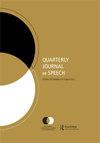关于占据无声的括号:《终结/ings》之后的思考-感受(第 1/2 部分)
IF 1.3
2区 文学
Q2 COMMUNICATION
引用次数: 0
摘要
将 "末日 "说成是流行的世界末日流派中描绘的大灾难式的未来事件,过于简化了末日时代的长期性和多重性,因为它们在各个时期的发展并不均衡。本文章由计算机程序翻译,如有差异,请以英文原文为准。
On occupying the silent parenthetical: Thinking-feeling after the Ends/ings (Part 1/2)
To speak of “the End” as a cataclysmic future event, as depicted in popular apocalyptic genres, oversimplifies the prolonged, multiplicitous character of the End Times as they unfold unevenly acros...
求助全文
通过发布文献求助,成功后即可免费获取论文全文。
去求助
来源期刊

Quarterly Journal of Speech
COMMUNICATION-
CiteScore
1.80
自引率
36.40%
发文量
39
期刊介绍:
The Quarterly Journal of Speech (QJS) publishes articles and book reviews of interest to those who take a rhetorical perspective on the texts, discourses, and cultural practices by which public beliefs and identities are constituted, empowered, and enacted. Rhetorical scholarship now cuts across many different intellectual, disciplinary, and political vectors, and QJS seeks to honor and address the interanimating effects of such differences. No single project, whether modern or postmodern in its orientation, or local, national, or global in its scope, can suffice as the sole locus of rhetorical practice, knowledge and understanding.
 求助内容:
求助内容: 应助结果提醒方式:
应助结果提醒方式:


